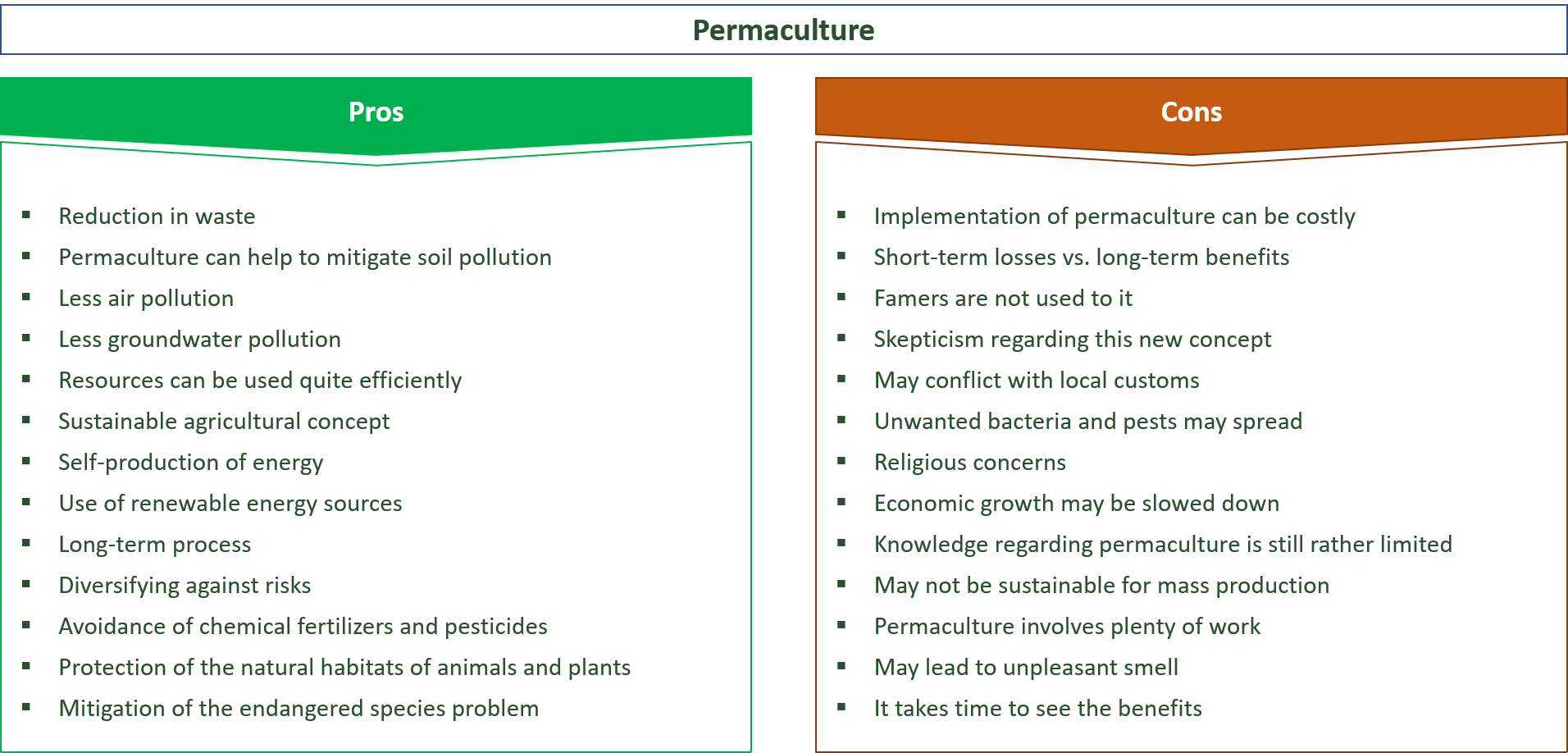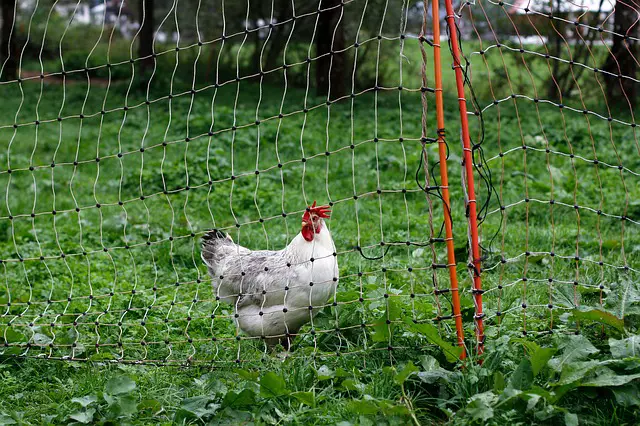“Permacultures – where you use the immediate environment to grow food – should be mandatory.”
Ian Brown, Musician
Advantages & Disadvantages of Permaculture

Permaculture is an agriculture concept which aims to make agricultural processes as natural and sustainable as possible.
Everything that is produced should either benefit people or the earth and nothing should be wasted.
Even though permaculture has many important advantages, there are also some problems related to this agricultural practice.
In this article, the pros and cons of permaculture are examined.
Audio Lesson
Contents
Advantages of Permaculture
- Reduction in waste
- Permaculture can help to mitigate soil pollution
- Less air pollution
- Less groundwater pollution
- Resources can be used quite efficiently
- Sustainable agricultural concept
- Self-production of energy
- Use of renewable energy sources
- Long-term process
- Diversifying against risks
- Avoidance of chemical fertilizers and pesticides
- Protection of the natural habitats of animals and plants
- Mitigation of the endangered species problem
- Savings in water
- Organic farming
- Composting can produce natural fertilizer
- Ethical benefits
- Permaculture community
Reduction in waste
One key advantage of permaculture is that it can lead to a significant reduction in waste.
The concept of permaculture aims to use our resources in the most efficient manner.
This also implies that nothing should be wasted and that our resources should either benefit the general public or nature itself.
Hence, if this concept is really lived by people, chances are that the overall waste production would be significantly lower compared to conventional agriculture, which will be quite beneficial for our environment since far less waste has to be burned or disposed into landfills.
Permaculture can help to mitigate soil pollution
In order to get rid of our waste, a big fraction of it will end up in landfills, where it can significantly pollute our soil.
With permaculture, the overall waste production is lowered significantly and therefore, also the soil pollution problem can be reduced.
Moreover, in conventional agriculture, large amounts of fertilizers and pesticides are used, which further pollute the soil and make it less fertile in the long run.
Through permaculture, far less chemical fertilizers and pesticides are used and thus, also the soil will be protected from several sorts of pollution in a much more efficient manner.
Less air pollution
Since permaculture is a concept that aims to make agricultural processes more sustainable and to protect our nature whenever possible, it also aims to reduce our emission levels.
Through permaculture, less agricultural machines that emit harmful gases into our atmosphere will be used.
Moreover, also the transportation distances with permaculture should be far lower compared to conventional agriculture.
Hence, this will lead to much better air quality and will also slow down global warming since fewer greenhouse gases are emitted into our atmosphere.
Less groundwater pollution
Soil pollution and groundwater pollution are closely connected.
If the soil becomes polluted through conventional agricultural processes, those contaminants will be washed through the soil into our groundwater sooner or later.
Water will become a quite scarce resource in the future due to global warming and it is therefore crucial that we protect our groundwater as best as possible.
Therefore, in order to avoid soil pollution and the related groundwater pollution, we should rely more on permaculture instead of conventional agriculture.
Resources can be used quite efficiently
Another advantage of permaculture is that our natural resources can be used in a quite efficient manner.
The concept of permaculture states that our resources should be either used to benefit humans or to benefit nature, but that nothing should be wasted.
Hence, if we have resources left that we don’t use anymore, those resources should be brought back to nature where animals can benefit from it.
Thus, through permaculture, our resources can be used as efficiently as possible, not only to benefit us humans but to benefit nature as a whole.
Sustainable agricultural concept
Since the concept of permaculture implies using our natural resources as efficiently as possible and also to avoid pollution as best as possible, it can be regarded as a quite sustainable concept.
In fact, this attitude towards life is exactly what we need right now in order to solve our environmental problems.
Even though the concept of permaculture may also have its weaknesses in practice, the values that are proposed by permaculture are crucial in order to overcome our global problems and to progress as humanity in general.
Self-production of energy
Another upside of permaculture is that this concept also implies that farmers also should try to produce their own energy.
In fact, in our nowadays society, it is rather easy to install solar panels on our roofs and to produce plenty of energy.
If every farmer did that, they could ensure their own energy supply by themselves and would likely even have plenty of energy left to distribute to other households.
Hence, permaculture can also help to make our global energy production much more efficient.
Use of renewable energy sources
In general, permaculture also advocates the use of renewable energy sources in agricultural processes.
Instead of using fossil fuels which will not be sustainable in the long run, we should rather rely on renewable energy sources in all parts of our daily life.
This is not limited to electricity, it also implies to rely on renewable energy sources like biodiesel or other substances that can help us to transit from fossil to renewable energies as soon as possible.
Long-term process
Permaculture does not aim for short-term goals, it can be regarded as a concept that will benefit humanity for hundreds or even for thousands of years and that is exactly what we need.
Too many of our actions are concentrated on short-term solutions rather than to really tackle the actual problem instead of just mitigating the symptoms.
Permaculture can really help us to make our agricultural processes sustainable in the long run and therefore also to ensure a livable future for the next generations.
Diversifying against risks
Another benefit of permaculture is that this concept can also help farmers to diversify against risks related to farming.
For instance, farmers may not rely on monoculture, but will plant a variety of different crops.
By doing so, certain pests cannot spread that easily and the yield will also not suffer too much in case of extreme climatic events since some plants are much better able to deal with those extreme conditions than others.
Consequently, agriculture in line with the concept of permaculture can also protect farmers from significant financial losses.
Avoidance of chemical fertilizers and pesticides
The concept of permaculture also implies relying on organic fertilizers instead of using chemical fertilizers and pesticides.
By doing so, many insects can be protected and also the problem of soil pollution and groundwater pollution can be limited to a certain extent.
Chemical fertilizers will also make the soil less fertile over time, which can lead to serious problems since the soil will no longer be suitable for agriculture sooner or later.
In turn, many people, especially in poor developing countries, will suffer from serious hunger and starvation if local farmers are no longer able to produce sufficient crop yields.
Protection of the natural habitats of animals and plants
Permaculture not only aims to benefit humans, but also to benefit our local flora and fauna.
It also advocates the concept that a certain amount of land should stay untouched by humans so that animals and plants can live and develop in an entirely natural manner.
Therefore, permaculture can also contribute to the protection of natural habitats for numerous animal and plant species.
Mitigation of the endangered species problem
Thanks to the protection of our natural habitats through permaculture, also the endangerment and extinction of our animal and plant species can be avoided to a certain extent.
Over the past decade, numerous animals and plants have become endangered or even extinct.
If we continue like that, chances are that we will lose a vast number of animals and plants over the next years and this kind of biodiversity loss may lead to unclear long-term effects that may potentially also hurt us humans since it can lead to serious ecological imbalance.
Savings in water
Permaculture also aims to use our water as best as possible.
This also implies collecting rainwater which can be used for agricultural processes instead of just using precious tap water.
In general, also the permaculture infrastructure is often built in a way that enables farmers to use water as efficiently as possible.
Since water will become a quite scarce and precious resource in the near future, we should save water on a global scale whenever possible and permaculture is a great way to save water in agricultural processes.
Organic farming
The use of permaculture also implies to make agricultural processes as organic as possible.
The concept of permaculture relies on the use of natural instead of chemical fertilizers, which will also help to make the end-product as organic as possible.
Moreover, also farm animals that are raised under the concept of permaculture will get organic food instead of concentrated feed like in conventional agriculture.
Thus, permaculture can make farming processes as organic as possible.
Composting can produce natural fertilizer
Composting is another big part of permaculture.
Since the concept of permaculture states that our natural resources should be used as efficient as possible and that nothing should be wasted, composting organic waste instead of burning it can be a great way to improve the efficiency of our natural resources use.
In fact, not only the emissions from burning organic waste can be avoided, composting also allows farmers to produce plenty of natural fertilizer over time, which can then be used to increase crop yields.
Ethical benefits
Apart from the many practical benefits related to permaculture, this concept also implies ethical upsides.
Permaculture aims to improve the quality of life, not only for us humans, but also for our flora and fauna.
It also aims to make the living conditions for our cattle as natural as possible and factory farming and other practices that imply to raise animals under quite poor conditions should be avoided at all costs.
Hence, also from an ethical perspective, permaculture should be preferred over conventional agricultural processes since it is simply a more sustainable and animal-friendly way to practice agriculture.
Permaculture community
People also get increasingly aware of the concept of permaculture.
In fact, there are many communities out there that aim to practice the concept of permaculture.
Hence, you can find many like-minded people in forums and can exchange ideas related to permaculture.
This will likely further improve your motivation to engage in this sustainable farming practice since you will see the progress and success of other people and will stay on track, even if you experience some problems of permaculture from time to time.

Disadvantages of Permaculture
- Implementation of permaculture can be costly
- Short-term losses vs. long-term benefits
- Famers are not used to it
- Skepticism regarding this new concept
- May conflict with local customs
- Unwanted bacteria and pests may spread
- Religious concerns
- Economic growth may be slowed down
- Knowledge regarding permaculture is still rather limited
- May not be sustainable for mass production
- Permaculture involves plenty of work
- May lead to unpleasant smell
- It takes time to see the benefits
- Permaculture can look quite messy
Implementation of permaculture can be costly
Apart from the many advantages of permaculture, there are also some downsides related to this concept.
For instance, one disadvantage of permaculture is that it can be quite costly to adjust agricultural processes and infrastructure in a way that the concept of permaculture can be really lived on a daily basis.
In fact, quite often, there are significant upfront costs related to permaculture and many farmers will not be able to finance those costs.
This is especially true for farmers in poor developing countries who are often barely able to survive.
Short-term losses vs. long-term benefits
It should also be noted that permaculture is a long-term game instead of a short-term solution.
Even though it makes sense to rely on long-term solutions, it may also lead to problems for many farmers since they have to invest significant money and have to wait an extensive period of time until they see the rewards.
Hence, many farmers may also refrain from permaculture since they don’t want to wait for returns for a long period of time but rather want to see short-term success.
Famers are not used to it
Another downside of the concept of permaculture is that many farmers all over the world are simply not used to it.
Many farmers simply don’t know how to adjust their agricultural processes so that they are in line with the principles of permaculture.
Quite often, those farmers would need a lot of education and help to make their processes more sustainable and in case they don’t get this help, chances are that many farmers will just stay with conventional agriculture since it is simply more convenient and practicable.
Skepticism regarding this new concept
Many farmers may also be quite skeptical regarding the concept of permaculture.
In many poor countries all over the world, the local population is dependent on the yields of farmers in order to ensure their food supply.
Thus, changing agricultural practices poses a great risk since if permaculture doesn’t deliver sufficient crop yields, the local population may suffer from serious hunger.
Hence, switching from conventional agriculture to permaculture also implies severe risks and farmers may rather rely on conventional farming practices since they have a proven track record.
May conflict with local customs
As humans, we do many things simply due to the fact that our ancestors did the same.
Quite often, we are told from a young age to comply with certain customs and traditions and many of us just comply with those customers without every questioning them at all.
Therefore, many farmers may still rely on conventional agricultural processes just to comply with local customs and traditions, even though permaculture might imply serious advantages in the long run.
Unwanted bacteria and pests may spread
Since the concept of permaculture also forbids to use chemical pesticides, chances are that bacteria and pests can spread quite easily, which may lead to the loss of crop yields.
Moreover, there will also be an increased chance for epidemics or even pandemics if bacteria are free to develop and to mutate.
Religious concerns
Permaculture may also conflict with religious world views.
For instance, in some religions, it can be quite common to sacrifice animals to please a certain god while permaculture tries to ensure the livelihood for as many humans, animals and plants as possible.
Hence, the values of permaculture and of certain religions may contradict each other, which makes it difficult to implement permaculture in regions where those kinds of religions are present.
Economic growth may be slowed down
Permaculture aims to make agricultural processes sustainable in the long run.
Yet, this also implies that farmers often have to refrain from short-term gains.
Moreover, permaculture may also slow down our overall technological progress since it will not support or advocate genetic engineering or other artificial processes in agriculture.
Knowledge regarding permaculture is still rather limited
In general, since permaculture is a rather new agricultural concept, farmers all over the world often lack the knowledge to change their agricultural processes so that they are in line with the principles of permaculture.
Hence, even though farmers may be willing to make chances, they may simply not be able to do so since they often just don’t have sufficient knowledge in this area.
May not be sustainable for mass production
Opponents of permaculture also often claim that this concept is not sustainable on a global scale.
Since our global population is growing and we will likely exceed ten billion people until the end of the 21st century, we have to take great efforts in order to be able to produce enough food to support all of us and permaculture may not be suitable to do so since it refrains from the use of chemical fertilizers which could optimize our crop yields.
Permaculture involves plenty of work
Apart from the financial commitment, permaculture also implies a lot of work.
Quite often, farmers have to adjust their processes and since fewer machines will be used in permaculture, farmers will also have to do more manual work.
Therefore, permaculture can also be considered to be more time-intensive and many farmers may simply not want to make this time commitment.
May lead to unpleasant smell
Since permaculture often relies on composting to use our natural resources as efficiently as possible, chances are that this kind of agriculture also implies the production of significant smell.
Through the decomposition of organic materials, plenty of unpleasant gases are emitted into the air.
This can significantly lower the quality of life of people living close to those composting sites.
It takes time to see the benefits
Since permaculture needs plenty of adjustments in agricultural processes, chances are that it will also take some time until the positive effects of permaculture unfold.
In fact, it can take several years to optimize agricultural processes in a way so that they are fully compliant with the principles of permaculture.
Permaculture can look quite messy
Since permaculture requires farmers to use our natural resources as efficient as possible, it also implies that nothing is wasted.
In turn, farming in line with permaculture can look quite messy since plenty of organic materials will be around the property and those properties may rather look like an organic landfill instead of a tidy agricultural business.

Top 10 Permaculture Pros & Cons – Summary List
| Permaculture Pros | Permaculture Cons |
|---|---|
| Permaculture can help to reduce waste | Permaculture may not work on a global scale |
| Avoidance of use of chemical fertilizer | Implies a lot of work |
| Can help to preserve water | Permaculture can be costly |
| Less soil pollution | Lack of knowledge regarding permaculture |
| Less air pollution | Conflicts with customs or religious beliefs |
| Efficient use of our natural resources | Technological progress may be slowed down |
| Permaculture can help to save many species | Composting may lead to unpleasant smell |
| Supports the concept of organic farming | Many farmers are skeptic regarding this concept |
| Ethical upsides of permaculture | Permaculture can be risky |
| Community around permaculture | Short-term losses vs. long-term gains |
Does Permaculture Make Sense?
Permaculture is a quite interesting agricultural concept which can definitely make sense in order to make our agricultural processes sustainable in the long run.
However, as we have seen before, there are also many problems related to permaculture.
Therefore, it is crucial to set up permaculture in a way so that farmers get all the long-term benefits while minimizing the downsides at the same time.
Only then will it be possible to implement the concept of permaculture on a global scale and to ensure a livable future for the next generation.
Sources
https://en.wikipedia.org/wiki/Permaculture
https://www.permaculturenews.org/
https://www.learnpermaculture.com/

About the author
My name is Andreas and my mission is to educate people of all ages about our environmental problems and how everyone can make a contribution to mitigate these issues.
As I went to university and got my Master’s degree in Economics, I did plenty of research in the field of Development Economics.
After finishing university, I traveled around the world. From this time on, I wanted to make a contribution to ensure a livable future for the next generations in every part of our beautiful planet.
Wanna make a contribution to save our environment? Share it!